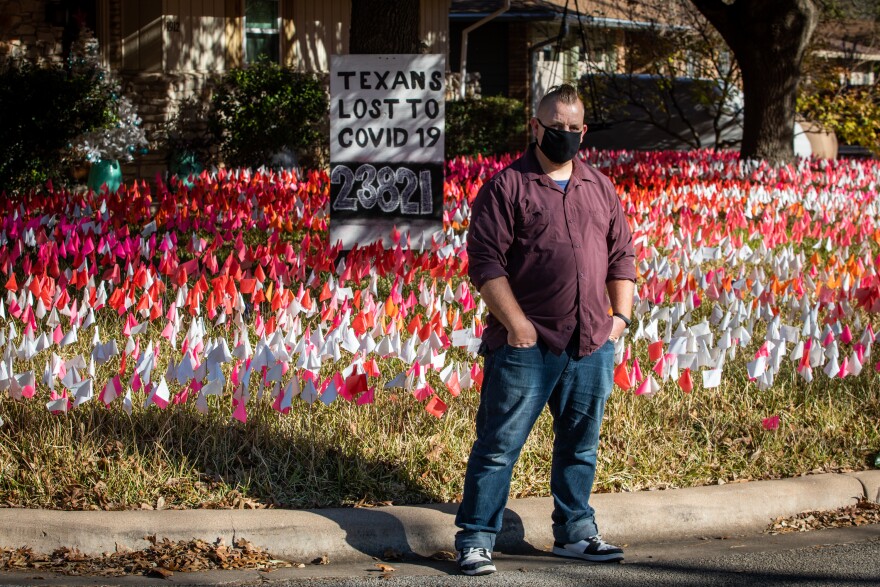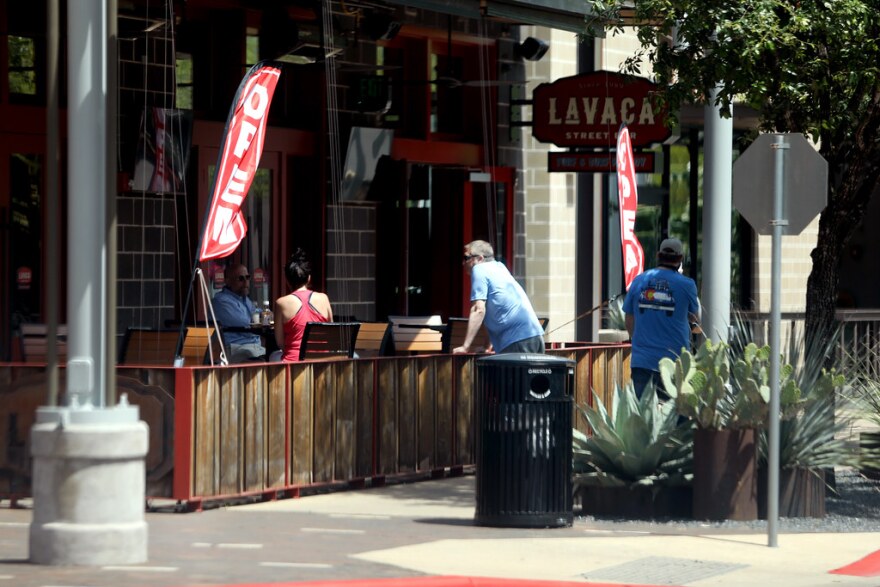To say 2020 was a difficult year would be an understatement. The cancellation of South by Southwest in March was just the start of the turmoil and uncertainty that would define the following months.
But amid all that, there were moments of hope and connection. And it is these moments that define many of the stories that were our favorites this year.
Austinites Who Depend On Real-Life Connections For Sobriety Find Community Online

So much of our reporting this year has been focused on the changing rules or situations around COVID-19. The moments we had to focus on what it’s like to live during the pandemic have felt the most rewarding. This story about people in recovery staying sober is an example of that.
At the beginning of the pandemic, when we were all in a bit of shock about what was happening, the amount people were drinking became almost a joke. I wondered what it was like for people who have chosen to be sober during this time. I found three Austinites who were willing to share their experiences, and I appreciated their honesty.
– Claire McInerny, education reporter
To Keep Austin's Racial Justice Movement In Motion, One Man Got On His Bike. Hundreds Followed.
This year was – yes, I’m going to say it again – unprecedented. Not only did the entire world change in what seemed like an instant due the pandemic, but we also witnessed the largest racial justice movement in a generation. It’s hard to put into words the toll both these events have taken on me as a reporter.

But this story was a sliver of hope in the midst of a lot of despair. One young man decided he wanted to take a bike ride around Austin with his friends to learn about the city's Black history. It was, for him, a small way to keep the momentum of the movement alive.
But it wasn’t small at all. Instead, it snowballed. Hundreds came together in solidarity and, unlike during the protests, there was no shouting, no violence, no tear gas. Only a bunch of people who wanted to learn more about the Black experience.
Donald Davis, who helped out with the tour, is a Black man who’s lived in the Austin-area for nearly 30 years. He told me he’d never seen that kind of brotherhood and sisterhood outside an MLK march. I think it’s fair to say we could all use a little more of that these days.
– Nadia Hamdan, reporter and Morning Edition host

Who Has The Ninja Style And Kung Fu Grip To Spray-Paint Austin's Most Visible Graffiti?
This story had nothing to do with COVID. That’s why I love it.
– Matt Largey, projects editor

As Austin Hunkers Down During COVID-19 Outbreak, One Neighbor Grabs Her Running Shoes
I wrote this story when just 10 people had tested positive for COVID-19 in Travis County.
It's a story about how people step up during a collective time of grief, as much of 2020 has been. One woman put on her running shoes to shuttle hand sanitizer and masks from neighbor to neighbor.
I love this story for the hope it brought.
Plus, I got a running partner for a morning.
– Audrey McGlinchy, City Hall reporter
This Austinite Is Still Planting Flags In His Yard For Every Texan Who’s Died From COVID-19

I interviewed an Austin artist who’s been sticking flags in his front yard for every Texan who has died from COVID-19. He was frustrated by people who weren’t taking the pandemic seriously, so he wanted to get their attention.
When Shane Reilly started the project in May, there were fewer than 1,000 deaths. When I interviewed him in December, Texas had lost more than 23,000 people to the virus. His yard overflows with flags – almost like a field of wildflowers. But once you read the sign above them, “Texans Lost To COVID-19,” the gravity of the situation sinks in.
It was interesting to learn that people have begun to see Reilly’s project as a memorial and have traveled from around the city to see it up close. He’s received letters encouraging him to keep going and donations to help him buy more flags.
Reilly says the project doesn’t really belong to him anymore. “I’m just the caretaker of it,” he told me. “This seems to belong to everyone who has lost somebody or who knows somebody who has lost somebody.”
– Marisa Charpentier, digital producer
Texas Is Slowly Starting To Reopen – But Not For Many People With Compromised Immune Systems
After a brief shutdown earlier this year, Texas decided to “reopen” its economy in May.

There was a push among state leaders – chiefly our governor, Greg Abbott – to reopen businesses and to get people back in those businesses for the sake of the economy. Eventually, restaurants and stores around Austin would be up and running.
But nothing could actually change for a vulnerable group of people.
This doesn’t get talked about as much as it should, but we have neighbors who simply cannot fight off something like COVID-19. For the many folks with compromised immune systems, exposure to the deadly virus is all but a death sentence.
For this story, I spoke to several people who are in that situation – people who don’t have the option of taking even a marginal risk. I think about them all the time.
I wish more people would, too.
– Ashley Lopez, politics and health care reporter
Amid The Pandemic, Austin Remembers The 256 Homeless Deaths On Austin's Streets In 2020

Homeless folks don't get obituaries often. Some aren't even identified by their given names, just "Male Friend" or "Female Friend." I could have just shown up to this memorial on Lady Bird Lake, talked to folks for all of eight minutes and had a short piece online. That didn't feel right. And, seeing as I'd met some of the folks being memorialized, it felt right to do right by them.
I was fortunate to cover this memorial with my colleague Julia Reihs, a return to relative normalcy. Julia and I have covered homelessness for the better part of two years. This was a get-the-band-back-together kind of moment, and we got to see a few folks we'd met out in the community, but hadn't seen in a long time because of COVID.
But another, more telling, sense of normalcy I felt was the ease with which folks were able to ignore it. 2020 has been hard on everyone, but the death toll of nearly 300 people experiencing homelessness was well above any year in recent memory. While organizers read the names of the dead, a shirtless dude was doing pull-ups about 12 feet away. About 150 people jogged by without batting an eye.
These Austinites don't get positive recognition or reinforcement en masse – in life or in death. Still, the people within this community came together (at a distance) to memorialize those they'd lost and to keep hope alive in a seemingly hopeless year.
– Andrew Weber, reporter


